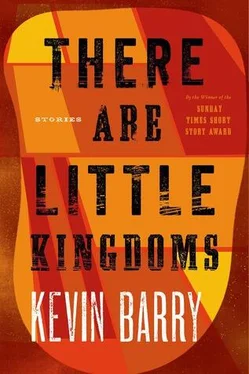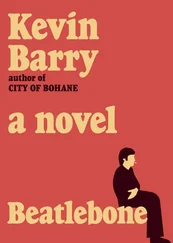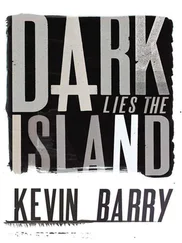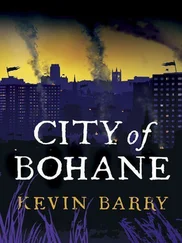Stranger talk, this, and there was unease now at the counter of The North Star. Even before our stout was settled and served, she was making good progress on the second small bottle of cabernet.
‘Are ye farming, men?’ she said.
‘You’d hardly call it that,’ I said, ‘at this stage.’
‘Site farmers!’ said Mr Kelliher.
‘Don’t mind him,’ I said.
‘You take what’s going,’ she said.
‘A fool not to,’ I said.
Certainly, these had been good years for us. The land of the vicinity wasn’t great, not by any stretch, but it had fine views of dreary hills, and the rivers were swollen with licey trout, and this was enough to draw people in. We sold them what space they wanted, having plenty to spare.
A truck went past, rattling the neat stacks of glasses, and Mr Kelliher shut his eyes, briefly, in suffering, and he was seen to suppress a swear.
‘More of it,’ he said. ‘They’re using it as a rat run, d’you see? Since they got in the traffic calming up on the Castle Walk. Bastards of lorries cutting down all day, you’ll pardon my French. What way are ye over for traffic calming?’
‘Measures are in place,’ she said. ‘But if you’re asking me if any good is being done?’
She shrugged. It was an expansive movement, performed, to let us know in the cheap seats that a wry puzzlement was signalled. She was a kind of woman not entirely unknown to us. In quietish towns, there are women with a great want for drama and heat, even if it’s only trouble that can bring it. Such a woman might often be the only throb of life in a place. We were stirred by her. Mr Kelliher’s mouth hung on its hinges and waves of emotion swept over him, as though she was a sacred daughter brought back from the wolves. Thomas, by the big red face on him, was clearly subject to notions himself. And I couldn’t wait to get home so as I could dream about her.
‘Take all the cars off the roads,’ she said. ‘All the trucks and all the jeeps. Build bonfires of the things and torch them. Watch them burn, wait for the tanks to blow. Storm the county councils and rip up the road plans. No more roundabouts and no more lay-bys. Anybody stepping anywhere near a vehicle of any mechanical description is put up against a wall and shot before night. Imagine it, lads — the world slows again to a human pace. We could saunter and stroll. How would that be?’
‘A woman,’ said Thomas, ‘after my own heart.’
‘Mind you,’ she said, and she held three fingers aloft, indicated with them our glasses, and winked for Mr Kelliher. ‘I was thankful for the car under me when I was putting distance between myself and Rhino Flynn.’
‘Who?’
‘My husband,’ she said.
‘And ye’re… separated now?’
‘We are,’ she said. ‘Since about half four this morning.’
She drained what was left of the second cabernet, made a start on the fresh. From a wallet of fine snakeskin she placed a note on the table.
‘One yourself, sir?’
‘Thanks, I won’t,’ said Mr Kelliher. ‘I haven’t drank in years.’
‘Oh?’
‘It wasn’t agreeing with me. A doctor put me on the spot and said I wouldn’t see forty.’
‘And now you’ve seen it,’ she said, ‘has it been worth it?’
‘Arguable,’ he said.
We went uncertainly into the afternoon. The classical station went into its period of great torpor, to the slowest dirges and dreamiest movements. Up top of the hill, the town could be heard to go about its Thursday business. Car doors slamming was the punctuation of the place. Soon enough, they’d let out from the primary school, and quick giddy footsteps would go past outside, and sing-song taunts in unbroken voices. We knew them all. We’d watch them grow taller and leave. The years come in, the years go out. The longer you’d sit and look at it, the life of the town would contract to almost nothing, to the merest glimpse of life, the tiniest crack of light against the black. It passes quickest in the slow places.
‘You’d hear him before you’d see him,’ she said. ‘Big old lunk. Big shit head on him. Powerful build of a man but a small child at the end of the day.’
‘Would be often the way, missus.’
‘You can call me Josie,’ she said, and the name was all her, it had carnival roll to it, and more drinks were arranged.
‘I don’t know would I have a Heineken?’ she said. ‘I have a throat on me but no, listen, I’ll stick with these. Grape or grain, never the twain.’
‘Hard-won wisdom,’ I said.
‘Married at all yereselves, lads?’ she said. ‘I didn’t think so. Ye’re as well not. Less complications.’
‘I could use complications,’ said Thomas.
‘Now!’ said Mr Kelliher. ‘That’s a ripe one, Tom.’
Thomas slugged off the high stool, he was embarrassed once the words slipped out, and he headed for the gents. She watched him over her shoulder, the tip of her tongue emerging between her lips.
‘What’s with the quiet man?’ she said.
‘The strong silent type,’ said Mr Kelliher.
‘Learned my lesson about them longo,’ she said.
I felt a thrumming within myself, the heartbeat had quickened, and Mr Kelliher worked the rag with the turn of the knot and the run of the grain, and we were nervous until Thomas got back.
‘So tell me,’ she said. ‘Is it always this hectic?’
She crossed and uncrossed her legs, there was a crack of lightning, and the afternoon was in around me like redcoats with muskets primed, and I said:
‘Would you put on a pint for me, Mr Kelliher?’
‘I would, Brendan.’
‘Cuz?’
‘Would you ever leave me live my fucking life?’ said Thomas.
‘He will, Mr Kelliher. Josie?’
‘One for the high road,’ she said.
Things settled again, and cream notes mingled with brown, and though I searched for the small talk that might work as lead to weight the balloon, there wasn’t need for it, because something had given away in Josie now: she showed herself more fully.
‘Strain in my neck from the car,’ she said. ‘Driving half the night on bad roads. But I had to get away from the other bastard. The poison got into the big fool and he couldn’t let me out of his sight. The next thing I know I’m on the floor of the garage tied down with flex.’
The schoolchildren passed by outside, high and excited, the sense of release, the daily fiesta of half past three, and the town’s noises would change and quicken with the afternoon, a particular agitation would surface, the rush and hubbub of it, people hurrying home to whatever was waiting, and normally at this time the pace of our drinking would quicken also. Often, it was the hour of the firewater.
‘This is what flex does,’ she said, and she shucked the cuffs of her sleeves to show the weals and the raised welts, blistered yellow and furious red, and soft consoling noises were made. Grip her gently in the darkness, pull her towards you: it would read like Braille.
‘Who were you talking to, he says. I seen you talking to him. Why were you talking to him…’ She shrugged it away. ‘I should have seen it coming.’
She finished what was left of her drink, and she regarded us with great fondness and there was an intimation that there was shared history to come, that she too would become a familiar of the premises.
‘It’s been something else, fellas,’ she said, and she carried herself to the door on careful heels, not a single step was sloppily placed.
‘I open at eleven,’ said Mr Kelliher, discreetly.
‘Good to know,’ she winked for him once more, and left.
So it was that The North Star was saved. With its five zinc-topped tables in the afternoon gloom, and the pendant flags of Tipperary, the gold and the blue, and its three high stools placed so by the bar. The turn of the dark wood’s knot, the run of its grain. The shine of the optics, the calender, the lulling music always played. The North Star is immune to all winds and complex troughs. The North Star is a safe haven.
Читать дальше












